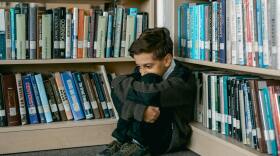Remote learning has been a challenge for many families, and that's certainly been the case for Stephanie Baker and her daughter in Durham.
Ariana, 6, lives with her mother Stephanie, who is able to work from home but has to help her do school work while working herself.
"I tell people all the time, I don't think god intended me to parent this many hours out of the day," Baker said with a chuckle. "I don't think that was part of the plan."
Baker is an assistant professor of Public Health at Elon University. She said that experience and her role as a member of the state's African American/Black Community Response team to address Covid-19 disparities has made her think more broadly about the decision to return to in-person instruction.
"I tell people all the time, I don't think god intended me to parent this many hours out of the day."
— ĽŞ˛ĘÍřÍřŐľ (@wunc)
Remote learning has been a challenge for many families and that's certainly been the case for Stephanie in Durham.
Hear how other NC parents are doing:
She points out that, if her daughter stays home, it will limit the number of people in the school building, keeping educators, school workers, and even families safer.
"I think our decision was really about the well-being of our community over an individual family need, and I say that in the context of having local family who live here that can help and support," said Baker, who notes that her parents live nearby and help watch her daughter one day a week.
Durham is the only district in the state that had announced it was staying all-remote, all-year. That changed when the General Assembly passed SB37, forcing all districts to offer in-person learning to those families that wanted it.
Durham Schools responded by starting re-open plans, and asked parents – via a survey – about their learning preferences. Those plans are now in flux, following the Governor's veto of SB37, and it being upheld in the NC Senate Monday night.
With all of the political twists and turns, the survey forced parents to reconsider their preferences. Baker was among the 51% who said they preferred remote learning for the rest of the year.

For another parent in that group -- Amber Moser – it was also a tough call. Her son Wyatt is an only child.
"Most of his play dates have been Zoom playdates," she said. "So it's been tough being a single kid and being isolated."
Moser has set up a workspace for her son, and her sister lives with them and works from home, so she is able to step in and help when Moser is away for work as a hospice nurse.
"We're pretty lucky and privileged that we have these resources," Moser said. "I know not everyone has that, which is why I'm hoping to give the opportunity to children who don't have the same kind of privilege and setup to be able to go back to school."
Not all families are as fortunate, or as flexible. In Durham School Board meetings, members have shared stories of parents who have to leave their young children at home alone while they go to work in person.
In the survey of Durham parents, at least 39% wanted in-person learning for the rest of the school year. It's even higher among families with elementary school students.
That was Allison Parker's choice. She works at a non-profit, and even though she can work from home, she has to be on phone calls and in Zoom meetings all day. Now, she and her daughter Chloe have gotten into a rhythm, but back in August, Chloe -- who's in third grade -- was missing classes regularly.
"She is a very shy and demure child and isn't very experienced in computer literacy at eight years old, so I just believe that she will improve if she's able to receive the information in person," said Parker, adding that Chloe's grades have suffered. And while she knows in-person learning this year isn't going to look like it would have in 2019, she wants to see if it helps.
"I am one of those people, obviously, that could probably keep my student home," Parker said. "I am not weighing those options, this is academic."
One thing many parents, administrators and Durham School Board members have agreed on is that each family needs to be able to make the decision that's right for them without judgment.







